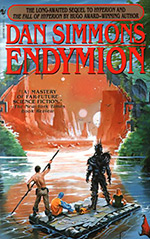
![]() verkisto
verkisto
7/26/2016
![]()
The first two books in the Hyperion Cantos are outstanding examples of what science fiction can be. The genre gets no small amount of flack from literary snobs for being vapid entertainment, but Dan Simmons injected a lot of power and resonance into science fiction with those two books. They were complex, thematic, and thoughtful, and continue to serve as examples of good science fiction for genre readers and others.
Endymion is another good read, but it lacks a lot of the resonance that I found in the first two books in the Cantos. It continues the story begun in the first two books, but instead of being a book about humanity's survival, it winds up just being a book about survival. The main characters -- Raul Endymion, Bettik the android, and Aenea, the supposed savior of the universe -- are on the run, and the story is one of plot over character. That's not to say that Simmons makes his characters two-dimensional; he's definitely a better writer than that. But where in the first two books the plot supported the characters, who in turn supported the theme, here it feels like that plot comes first.
As a standalone book, Endymion shines as a good science fiction read, though it won't stand out as a good example of literary science fiction. The connection to the first two stories is clear, despite it being set nearly 300 years beyond what happened in the first two books, but the book ultimately feels like another story set in the same universe than it does a sequel to the first two books (which it's clearly advertised to be, thanks to the blurb on the front cover). Fans of the first two books expecting to find a continuation of that series will be disappointed, I think.
Fans of good stories, though, will find a lot to like here. The story is compellingly readable, even more so than the first two books since Simmons does choose to focus on the plot more. The element of the chase drives the story, and Simmons has been doing this long enough to know how to keep the tension going, how to make the calls even closer as the parties keep evading each other throughout. As the book nears its end, I defy any reader to put it down to "finish later". Simmons ramps up the stakes and the action at the same time, and the need to finish the book at that point is palpable.
The characters are well-written, and there's nothing about their motivations that feels forced or contrived. You'll never question why Raul and Bettik continue to accompany Aenea, nor will you wonder why Aenea is continuing forward with her journey (well, you will, but that's only because we don't really know what the point of the journey is at this point). Father de Soya is also never made out to be a mystery; his motivations and his drive are clear from start to finish, and he never sacrifices his own character just to keep the story moving.
In short, the book is a good read, but it suffers because it's part of the Hyperion Cantos, meaning most readers will be expecting something on par with the first two books in the series. It's still possible that the story could be elevated to something higher with the last book; after all, Hyperion was just the exposition for the larger story that made up The Fall of Hyperion. Plus, we're talking about Dan Simmons here. He's not the type to just write a mindless story with a Maguffin, now, is he?